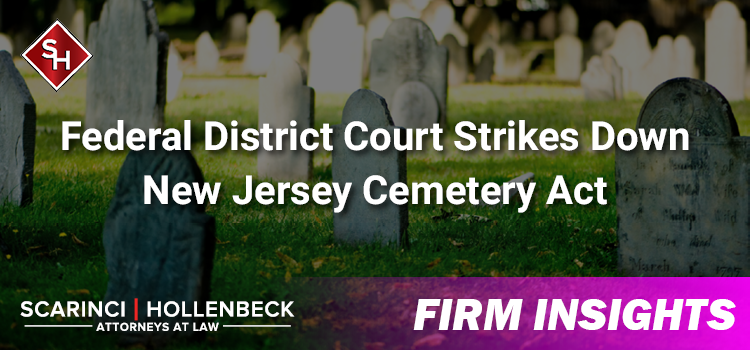
The United States District Court for the District of New Jersey recently struck down the New Jersey Cemetery Act. In Rosedale and Rosehill Cemetery Association v. Twp. of Readington, the federal court ruled that the statute, which empowers municipalities to consent to new cemeteries within their borders, is unconstitutionally vague.
Facts of the Case
Rosedale and Rosehill Cemetery Association (“Plaintiff” or “Rosedale”), a non-profit cemetery company, applied to the Township of Readington and its Township Committee (collectively, “Defendants” or “the Township”) to open a cemetery. After extensive negotiations with the Planning Board, and four days of hearings over the course of a year, the Township denied Rosedale’s application pursuant to its authority under N.J.S.A. § 45:27- 25(a). The statute provides in full:
a. A cemetery shall not be established or enlarged in any municipality without first obtaining the consent of the municipality by resolution.
b. No more than five cemeteries may be established in any one municipality, and not more than 3% of the area of any municipality shall be devoted to cemetery purposes.
c. A cemetery shall not be established or expanded to exceed 250 acres at any one location.
d. The governing body of a municipality, by resolution, may waive the limitations of subsection b. or c. of this section if it finds that there is a public need for additional cemetery lands and that it is in the public interest to waive them.
e. A cemetery company shall not dedicate additional land to cemetery purposes without board approval.
In the lawsuit that followed, Rosedale argued that two provisions of the Cemetery Act, N.J.S.A. § 45:27-25(a) and N.J.S.A. § 45:27-25(d), violated the U.S. Constitution’s Due Process Clause because they gave the Township unfettered discretion to establish cemeteries. Specifically, Rosedale maintained that subsection (a), the consent provision, was unconstitutional because it failed to “specify[] any standards for such consent,” and that subsection (d), the waiver provision, likewise lacked a “sufficiently definite standard.” In response, the Township asserted that these provisions were a permissible delegation of state legislative power and that it properly denied Rosedale’s application.
District Court’s Decision
The district court granted Rosedale partial summary judgment, holding that “subsection (a) of N.J.S.A. § 45:27-25 of the Cemetery Act is unconstitutionally vague under the Due Process Clause of Fourteenth Amendment.” Because subsection (a) could not be severed from the rest of the provisions of § 45:27-25 (b)-(d), the court further declared the entire statute unconstitutional. The court stayed its order for 30 days to provide the New Jersey Legislature an opportunity to amend the statute.
In reaching its decision, the court explained that the Due Process vagueness doctrine “addresses at least two connected but discrete due process concerns: first, that regulated parties should know what is required of them so they may act accordingly; second, precision and guidance are necessary so that those enforcing the law do not act in an arbitrary or discriminatory way.”
The court was not persuaded by the Township’s arguments that subsection (d) provided sufficient for subsection (a), nor the State’s argument that subsection (a) could fairly be read in the context of the Municipal Land Use Law. Instead, the court noted that subsection (a) does not 1) provide a statutory definition of consent, 2) narrow the contexts in which consent may or may not be granted, or 3) “provide any signal whatsoever as to the circumstances under which the Township will approve a new cemetery apart from waiver.” The court further explained:
In short, the municipal consent provision “is vague, not in the sense that it requires a person to conform his conduct to an imprecise but comprehensible normative standard, but rather in the sense that no standard of conduct is specified at all.” The concern, here, is the provision’s lack of limiting principles: it places no boundaries on the Township’s power to grant or withhold consent and, to that extent, vests the Township with unfettered discretion. As subsection (a) stands, whether the Township approves a cemetery application hinges on the whims of the Committee members. With little effort, I can formulate dozens of arbitrary and/or improper reasons why the Township might reject a new cemetery—from the name of an applicant’s business or a disagreement with a separate zoning ordinance to cronyism, economic protectionism, ethnic or racial bias, or a preference for a particular religion.
The district court also concluded that N.J.S.A. § 25:27-25(a) was not severable from the remainder of the statute. “Although subsection (a) is just one provision among thirty-eight in the Cemetery Act, severing it from the remainder of the provisions in N.J.S.A. § 45:27-25 frustrates the core legislative plan of that part of the statute—comprehensive municipal consent—such that this Court must invalidate N.J.S.A. § 45:27-25 ‘as a unitary whole,’” the court wrote.
Finally, the district court stayed its decision for a period of 30 days to give the New Jersey Legislature an opportunity to enact a new version of N.J.S.A. § 45:27-25. According to the court, the Legislature “would be well-advised to clarify the uncertainties in the statute raised by the parties and the Court in this Opinion.”
Striking down the statue in its entirety removes municipalities’ ability to consent to new or enlarged cemeteries within their borders. Accordingly, it is likely that the New Jersey Legislature will intervene to remedy the constitutional defect. We encourage local governments to check back for updates.
For more information about the court’s decision in Rosedale and Rosehill Cemetery Association v. Twp. of Readington or the legal issues involved, we encourage you to contact a member of Scarinci Hollenbeck’s Government Law Group.
